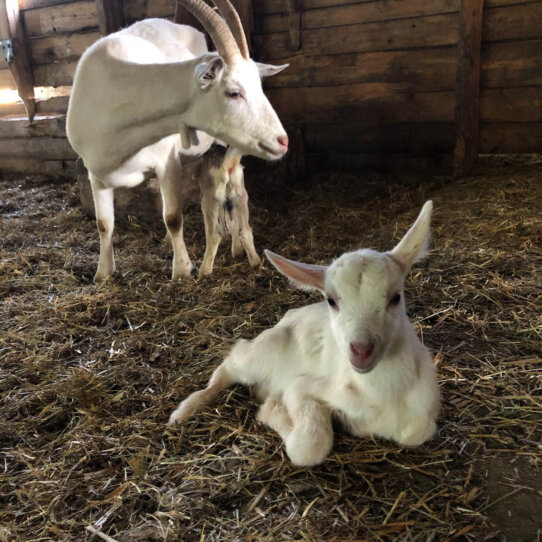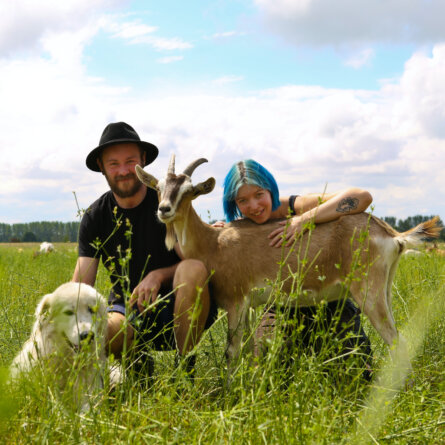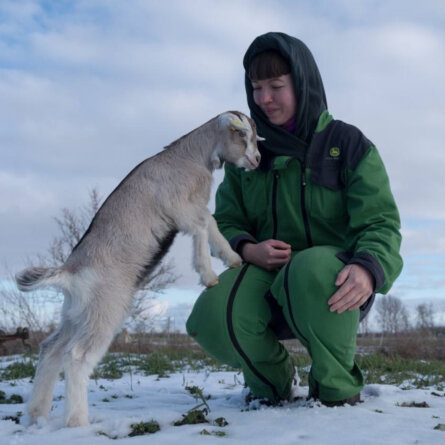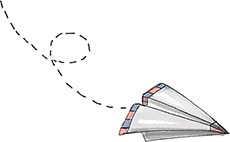Opening Times
Season 2021 from 12 February to 14 November
Friday: 11:00am - 7:00pm
Saturday + Sunday 9:00am - 7:00pm
From Monday to Thursday no café operation / yard sale!
Address
Ziegenkäserei & Wiesencafé Karolinenhof
Karolinenhof 1
16766 Kremmen
. How to get there
Contact
Sarah Spindler looks after around 120 goats on the Karolinenhof farm. She makes delicious cheese from their milk, which she sells in her own farm store and café. The goats don't know about weekends or closing time.
"Go ahead and go to the barn, the goats are also happy about a little change!", Sarah encourages me. In the stall, Sarah and I are surrounded by baby goats; when I'm there, it's lambing time. They nibble at my shoes, my coat, my pants. Behind us there is a clatter: the kid Klitzeklein has broken out, climbed onto a chair and fallen over. We laugh. Goats have minds of their own, that's what Sarah loves about them. "Right now, they're always breaking out of the barn. It's always fun with them."
Sarah Spindler runs the cheese dairy and Karolinenhof with her husband Sebastian, with around 120 dairy goats. Gela Angermann and her late husband Roger Lemke turned it into a goat farm. In 1991 they bought the old LPG farm, at that time it was a cattle farm. Gelas and Rogers idea was to produce goat cheese on the Karolinenhof and sell it in nearby Berlin.
A short time later they have 45 goats, and the word of Karolinenhof cheese spreads quickly. Gela and Roger sell it from the farm, and gradually a catering business develops, which Gela still takes care of today. The café serves everything from the goat: goat milk café, goat goulash and even goat cheesecake. And always something without goat "for people who are dragged along. But we can also convert many here," says Sarah proudly.
As a young woman from Berlin Prenzlauer Berg, she is drawn to nature and animals, but she didn't know at the time that farming was an apprenticeship. "As a city kid, I thought you'd be born a farmer and then take over a farm," she confesses. After graduating, she did a Voluntary Ecological Year at Domäne Dahlem, where she eventually fell in love with agriculture.
At the beginning of the FÖJ, she is assigned a baby calf, which she raises for the year. At Domäne Dahlem, cattle, especially old breeds, play a big role in everyday life on the farm. They are not only used for milk and slaughter, but also for agricultural purposes or to pull carriages. Sarah also learns there how to plow a field with an ox - and how to ride one: "There's a lot of mass, it's very buff." The fascination for cows and cattle won't let her go. After the FÖJ, she begins her training as a farmer at the Kuhhorst organic farm - and finds an apartment with Gela on the neighboring Karolinenhof.
After the apprenticeship, where she meets her husband Sebastian, she studies agriculture. They spend their semester abroad together on a Swedish goat farm. There Sarah stands in the cheese dairy for the first time. Gela follows the whole thing via social media. When she returns, she asks the couple, who are friends, if they could imagine running the Karolinenhof. In the meantime, Sarah and Sebastian take care of the goat herd, their lambs, the cheese dairy, cheese sales and marketing.
Besides the goats, two large white herding dogs of the Italian Maremmano Abruzzese breed live here. Because the wolf has been showing itself again regularly in Brandenburg for several years. In addition, a pony and a donkey, a cat and a few chickens that run freely around the farm in the summer. The 30 hectares of land are used for grazing and hay production. In recent years, they also planted grain there for supplemental feeding, but "one year it completely drowned on us, then withered in recent years."
In the meantime, they prefer to buy in the grain because of climate change and extreme weather conditions. In organic quality, of course, because that is Sarah's deep conviction. Even when she moved into a shared apartment with a friend at 16, they had green electricity and bought only organic animal foods despite their small budget. "I also have friends who are conventional farmers. But that just wouldn't be an option for me."
She has several reasons for this. Under no circumstances does she want to be dependent on large seed companies; she has few good words for Monsanto and Bayer. She also loves working closely with animals and being one with nature: "We take what we get from nature and work with it." It's exhausting.
Especially during lambing season. Goats do give birth on their own, but with 120 goats, there's always something going on. It wasn't until the night before my visit that a goat started acting strange. "I examined her and found that there was a kid stuck in the birth canal." Sarah demonstrates by gently grabbing the small hind legs of one of the kids surrounding her and pushing the rear end forward. "We called the vet and found there were two more in the mother's belly.... They're lively, everything went well," Sarah sounds routine, but also a little proud. The goats just don't know when to call it a day.
When Sarah shows me the milking parlor, the freshly born little lamb "Klitzeklein" follows us. She is being cared for during milking because she does not accept the artificial teats in the enclosure. Klitzeklein sniffs around curiously, Sarah takes her in her arms and cuddles her face into the soft fur of the kid.
To give milk continuously, goats have to have offspring. Many people wouldn't know that. Sarah also sees her job as education, especially for city kids like she once was. Many people from the city know nothing about the animals whose products they consume. Sarah makes up to 20 types of raw milk cheese in the farm's own cheese dairy. She shows the customers how cheese is made and also disillusions them: the cute little lambs have to be slaughtered at some point.
After all, Sarah can't raise them all. She keeps about 25 lambs to keep the flock going, and the rest are slaughtered by a conventional butcher in the area. The nearest organic slaughterhouse would be a few hours away. "We just don't want to put our animals through that." Karolinenhof is certified organic, but the goat meat is not.
For slaughter plants, certification is not based on how the animal is handled. Her butcher treats her goats with respect. She knows how to convey this to her customers, most of whom are private. Their enthusiastic feedback, plus the work with animals and nature fulfills the Berlin native, "you see in the evening what you have accomplished."
And yet sometimes it does you good to get out. She especially appreciates that about being close to Berlin, where she has many friends. "In 30 minutes, I'm in Prenzlauer Berg." Last year, she was in Scotland with a friend. Longer time away, however, is rare. The farm, the goats, the cheese, that's her responsibility.
Nevertheless, she would never swap. "If I won the lottery, I'd fix everything up here from scratch," she says with shining eyes, pointing to the old barn, the roof where it sometimes rains through. Only the cattle haven't really let Sarah go yet. Someday she wants to keep some again. She'd love to have an old breed like the ones at Domäne Dahlem.
Translated by Alexander Brandes










